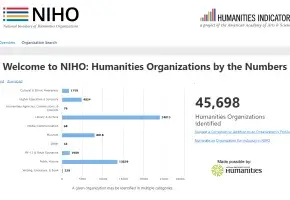
The Humanities Indicators is a nationally recognized source of nonpartisan information on the state of the humanities, providing researchers, policy-makers, journalists, humanities practitioners, and engaged citizens with better tools to answer basic questions about the past, present, and future of the field.
New: A wide-ranging survey of humanities departments—the fourth conducted by the Humanities Indicators project since 2008—offers fresh evidence on the state of the academic humanities. You can read the report here or download the PDF.

To address a need for statistical data in the humanities, the Academy, in collaboration with humanities institutions and leaders throughout the country, developed a set of reliable, comprehensive, and consistently updated statistical data necessary to chart trends and draw conclusions, including a standard definition for the humanities. The Humanities Indicators cover five categories: 1) primary and secondary education; 2) undergraduate and graduate education; 3) humanities research and funding; 4) the humanities workforce; and 5) the humanities in American life.
The Indicators data are drawn from existing sources and the project is also generating new data through surveys of colleges and universities, the humanities in American life survey, and a National Inventory of Humanities Organizations. The Humanities Indicators are designed to equip researchers and policymakers, universities, foundations, museums, libraries, humanities councils, and other public institutions with better statistical tools to answer basic questions about the state of the humanities.
Register to receive notification of new indicator updates, original research, and issues of our research brief series.
People
Norman Marshall Bradburn
Edward Ayers
Jack Buckley
Jonathan R. Cole
Joy Connolly
John Dichtl
Michael Hout
Felice J. Levine
Phoebe Stein
Judith Tanur
Carolyn Fuqua
Sara Mohr
Robert B. Townsend
Publications
From Matriculation to Completion: How College Students Move Between Majors
Tracking the Health of the Humanities at HBCUs
Employment Outcomes for Humanities Majors: State Profiles
State of the Humanities 2022: From Graduate Education to the Workforce
State of the Humanities 2021: Workforce & Beyond
The Humanities in American Life: At a Glance
The Humanities in American Life
Humanities Education in Community Colleges
The Humanities in Our Lives
The State of the Humanities 2018: Graduates in the Workforce & Beyond
The State of the Humanities: Higher Education 2015
The State of the Humanities: Funding 2014
Humanities Report Card 2013
Tracking Changes in the Humanities
Foundation Funding for the Humanities: An Overview of Current and Historical Trends
Making the Humanities Count: The Importance of Data
Project Outcomes
The Humanities Indicators project releases frequent data updates throughout the year pushed to subscribers and periodic publications that package interesting data that responds to questions and concerns in the field, or support other Academy projects.
The Humanities Indicators are a resource for college administrators, policymakers, and the media, answering questions about the trends, and occasionally providing data runs tailored to their specific needs.
To stay apprised of where and how the Indicators have impact, please register to receive notification of new indicator updates, original research, and issues of our research brief series.
The Humanities Indicators are funded by the Andrew W. Mellon Foundation. The project was developed with generous support from the National Endowment for the Humanities; Elihu Rose and the Madison Charitable Fund; John P. Birkelund; Peck Stackpoole Foundation; Rockefeller Foundation; Sara Lee Foundation; Teagle Foundation; Walter B. Hewlett and the William R. Hewlett Trust; and William and Flora Hewlett Foundation.
Any views, findings, conclusions, or recommendations expressed in this website do not necessarily represent those of the funders.













































